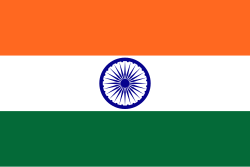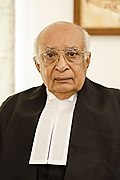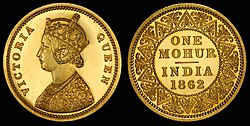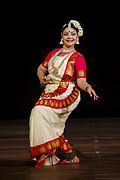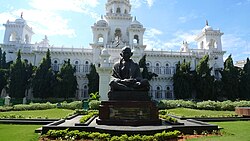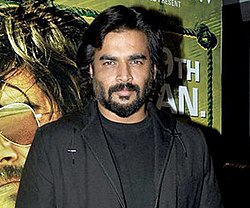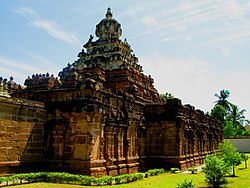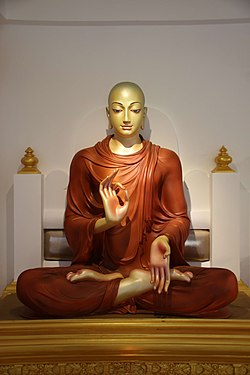
Back بوابة:الهند Arabic ৱিকিচ'ৰা:ভাৰত Assamese Portal:Hindistan Azerbaijani প্রবেশদ্বার:ভারত Bengali/Bangla دەروازە:ھیندستان CKB Portál:Indie Czech Portal:Indien German Portalo:Barato Esperanto Portal:India Spanish درگاه:هند Persian
Introduction


India, officially the Republic of India, is a country in South Asia. It is the seventh-largest country by area; the most populous country from June 2023 onwards; and since its independence in 1947, the world's most populous democracy. Bounded by the Indian Ocean on the south, the Arabian Sea on the southwest, and the Bay of Bengal on the southeast, it shares land borders with Pakistan to the west; China, Nepal, and Bhutan to the north; and Bangladesh and Myanmar to the east. In the Indian Ocean, India is near Sri Lanka and the Maldives; its Andaman and Nicobar Islands share a maritime border with Thailand, Myanmar, and Indonesia. (Full article...)
Selected pictures
Suriya is an Indian actor and film producer who works primarily in Tamil cinema. He made a commercially successful cinematic debut in Vasanth's Nerrukku Ner (1997). After few critical and commercial failures, Suriya collaborated with Vasanth again in Poovellam Kettuppar (1999), his first film with his future wife Jyothika.
In 2001, Suriya starred in Bala's Nandhaa as an ex-convict trying to find his place in society. The film was critically acclaimed and became a turning point in his career. His roles as a police officer in Gautham Vasudev Menon's Kaakha Kaakha (which became his first blockbuster) and a con artist in Bala's Pithamagan, established him as one of Tamil cinema's leading actors. Suriya's performances in both films were praised, winning him a Best Actor nomination for the former and the Best Supporting Actor for Pithamagan at the 51st Filmfare Awards South. The following year, he played dual roles—a hunchback and a college student—in Perazhagan. Suriya's performance was again praised, and he received his first Filmfare Best Actor award. He was also acclaimed for his performance as a student leader in Mani Ratnam's Aayutha Ezhuthu (2004). (Full article...)

The chief minister of West Bengal (IAST: Paścim Baṅgēr Mukhya Mantrī) is the de facto head of the executive branch of the Government of West Bengal, the subnational authority of the Indian state of West Bengal. The chief minister is head of the Council of Ministers and appoints ministers. The chief minister, along with their cabinet, exercises executive authority in the state. The governor appoints the chief minister, whose council of ministers are collectively responsible to the assembly.
On 17 August 1947, the British Indian province of Bengal was partitioned into the Pakistani province of East Bengal and the Indian state of West Bengal. Since then West Bengal has had seven chief ministers, starting with Prafulla Chandra Ghosh of the Indian National Congress (INC) party as the premier (elected to lead the assembly while the chief minister is not appointed). Dr. Bidhan Chandra Roy in 1950 became the first formal chief minister of West Bengal after the implementation of the Indian Constitution. A period of political instability followed thereafter—West Bengal witnessed three elections, four coalition governments and three stints of President's rule between 1967 and 1972—before Siddhartha Shankar Ray of the INC served a five-year term. (Full article...)

Indian actress Tabu appears primarily in Hindi, Telugu, and Tamil films. Her first credited role came as a teenager in Dev Anand's Hum Naujawan (1985), and her first major role was in the Telugu film Coolie No. 1 (1991). In 1994, Tabu received the Filmfare Award for Best Female Debut for the Hindi action drama Vijaypath, which marked her first of many collaborations with co-star Ajay Devgn. The year 1996 was key for Tabu. Her performance as a young woman affected by the Punjab insurgency in Gulzar's Maachis proved to be a breakthrough, winning her the National Film Award for Best Actress. Also that year, Tabu won the Filmfare Award for Best Actress – Telugu for the romance Ninne Pelladata, and featured alongside Govinda in the comedy film Saajan Chale Sasural.
Tabu had a brief role in the war film Border, the highest-grossing Hindi film of 1997, and portrayed a village girl opposite Anil Kapoor in the Priyadarshan-directed drama Virasat. Among her 1999 releases were two of the top-grossing Bollywood films of the year—the comedy Biwi No.1, and the family drama Hum Saath-Saath Hain. She also starred as the rebellious daughter of a corrupt politician in Gulzar's critically praised drama Hu Tu Tu (1999). The following year, she starred in Kandukondain Kandukondain, a Tamil adaptation of Sense and Sensibility, and played a submissive homemaker in the bilingual drama Astitva. Tabu garnered a second National Film Award for Best Actress for portraying a bar dancer in Madhur Bhandarkar's crime drama Chandni Bar (2001). In 2003, she starred in the Bengali film Abar Aranye, and portrayed a character based on Lady Macbeth, in Maqbool—an adaptation of Macbeth from Vishal Bhardwaj. Following a few commercial failures, Tabu played triple roles in M. F. Husain's musical drama Meenaxi: A Tale of Three Cities. Tabu's first international project came with Mira Nair's adaptation of Jhumpa Lahiri's novel The Namesake. In R. Balki's Cheeni Kum (2007), Tabu starred alongside Amitabh Bachchan as a woman romantically involved with a much older man; the role earned her a record fourth Filmfare Critics Award for Best Actress. (Full article...)
Preity Zinta is an Indian actress, who has received several awards for her acting in Hindi films. Her career began in 1998 with Mani Ratnam's acclaimed drama Dil Se.. and the box office hit Soldier. Both films won her the award for Best Female Debut at the 44th Filmfare Awards. Her performance in Dil Se.. also earned her a Best Supporting Actress nomination at the same ceremony, while Soldier won her three more Best Debut awards at other major ceremonies. Zinta received her first Filmfare nomination for Best Actress for her portrayal of a teenage single mother in Kya Kehna. She followed these films with several critically and commercially successful films, such as Mission Kashmir (2000) and Dil Chahta Hai (2001), and her performances in Chori Chori Chupke Chupke (2001), Dil Hai Tumhaara (2002) and Armaan (2003) were praised.
Zinta won several awards for her performance in the romantic comedy-drama Kal Ho Naa Ho, including her first and only Filmfare Award for Best Actress. She went on to star in top-grossing productions in India and abroad, including Koi... Mil Gaya (2003), Veer-Zaara (2004), Salaam Namaste (2005) and Kabhi Alvida Naa Kehna (2006), all of which earned her different nominations at major award ceremonies, which, in addition to Filmfare, include such organisations as Screen, Zee Cine, the International Indian Film Academy (IIFA), and Stardust, among others. After a relatively low phase, she started appearing in arthouse films, known in India as parallel cinema. She played her first international film role in Deepa Mehta's Canadian drama Heaven on Earth (2008, titled Videsh in India). Her portrayal in the film won her the Silver Hugo Award for Best Actress at the Chicago International Film Festival, and she was a Best Actress nominee at several award functions in Canada, including the Genie Awards by the Academy of Canadian Cinema & Television, and the Vancouver Film Critics Circle. (Full article...)

The National Film Award for Best Actress in a Leading Role is an honour presented annually at the National Film Awards of India since 1968 to an actress for the best performance in a leading role within the Indian film industry. The National Film Awards were called the "State Awards for Films" when established in 1954. The State Awards instituted the "Best Actress" category in 1968 as the "Urvashi Award for the Best Actress"; in 1975, the Urvashi Award was renamed as the "Rajat Kamal Award for the Best Actress". Throughout the years, accounting for ties and repeat winners, the Government of India has presented a total of 61 Best Actress awards to 49 different actresses. Since the 70th National Film Awards, the name was changed to "National Film Award for Best Actress in a Leading Role".
Until 1974, winners of the National Film Award received a figurine and certificate; since 1975, they have been awarded with a "Rajat Kamal" (silver lotus), certificate and a cash prize that amounted to ₹2 lakh (US$2,400) in the 70th edition. Although the Indian film industry produces films in more than 20 languages and dialects, the actresses whose performances have won awards have worked in eleven major languages: Hindi (25 awards),Tamil (8 awards), Bengali (7 awards), Malayalam (6 awards), Telugu (4 awards), Kannada (3 awards), English (3 awards), Marathi (2 awards), Assamese (one award), Gujarati (one award) and Urdu (one award). (Full article...)

The Victoria Cross (VC) was introduced in Great Britain on 29 January 1856 by Queen Victoria to reward acts of valour during the Crimean War. For the Indian Mutiny (also known as India's First War of Independence, Revolt of 1857, or the Sepoy Mutiny) the VC was awarded to 182 members of the British Armed Forces, the Honourable East Indies Company (HEIC) and civilians under its command. The VC is the highest British honour and is awarded for valour "in the face of the enemy". Created in 1856 for the British Army and Royal Navy, eligibility was extended in 1857 to members of the HEIC and in 1858 to non-military personnel bearing arms as volunteers.
Queen Victoria created the tradition of the British monarch presenting the VC to the recipient, personally presenting 74 of the 111 awards for the Crimean War. Many VCs for the Indian Mutiny were sent to India for presentation and while there is documentation for 42 presentations, the information on 51 presentations which were likely presented in India is vague and it not known if the medal was personally presented or received by post. There were 18 Indian Mutiny VCs sent to next of kin where the award was posthumous, or the recipient died before presentation. The Queen personally presented 63 Indian Mutiny awards after the recipients returned to the UK. (Full article...)

Haider is a 2014 Indian crime-drama film directed by Vishal Bhardwaj, and produced by Bhardwaj and Siddharth Roy Kapur. The film stars Shahid Kapoor as the eponymous protagonist, and co-stars Tabu, Kay Kay Menon, Shraddha Kapoor, and Irrfan Khan. Bhardwaj wrote the dialogues for the film, and co-wrote the screenplay with Basharat Peer. Bhardwaj also composed the music and Gulzar wrote the lyrics. The film is a modern-day adaptation of William Shakespeare's tragedy Hamlet, and tells the story of Haider who searches for his missing father during the Kashmir conflict of 1995.
Produced on a budget of ₹240 million (US$2.8 million), Haider was released on 2 October 2014, and grossed ₹690 million (US$8.2 million) worldwide. The film garnered awards and nominations in several categories, with particular praise for its direction, performances of Shahid Kapoor and Tabu, music and production design. As of June 2015, the film has won 36 awards. (Full article...)

Kal Ho Naa Ho (transl. Tomorrow May Never Come) is a 2003 Indian Hindi-language romantic comedy-drama film directed by Nikkhil Advani. The film stars Jaya Bachchan, Shah Rukh Khan, Saif Ali Khan and Preity Zinta. Sushma Seth, Reema Lagoo, Lillete Dubey and Delnaaz Irani play supporting roles. The film's story focuses on Naina Catherine Kapur (Preity Zinta), an MBA student who falls in love with Aman Mathur (Shah Rukh Khan). He does not reciprocate her feelings as he is a terminally ill heart patient, a fact he hides from Naina. Aman does not wish to bring Naina any pain through his illness, and tries to make her fall in love with her friend and fellow MBA classmate Rohit Patel (Saif Ali Khan). The film's dialogues were written by Niranjan Iyengar while Karan Johar drafted the story and screenplay. The latter also co-produced the film with his father, Yash Johar, under the Dharma Productions banner. The soundtrack for Kal Ho Naa Ho was composed by Shankar–Ehsaan–Loy while Javed Akhtar wrote the lyrics for its songs. Anil Mehta and Sanjay Sankla handled the cinematography and editing respectively. Sharmishta Roy was in charge of the production design.
Produced on a budget of ₹280 million, Kal Ho Naa Ho was released on 27 November 2003 and received positive reviews from critics. It was a commercial success, grossing ₹860.9 million worldwide. The film won 35 awards from 78 nominations; its direction, story, screenplay, performances of the cast members, music and cinematography have received the most attention from award groups. (Full article...)

Trisha Krishnan[a] is an Indian actress known for her work primarily in Tamil and Telugu cinema. She is the only South Indian actress to have sustained a successful career as a leading actress for over two decades in Tamil cinema. She was first seen in 1999 in a minor supporting role in Jodi and later appeared in 2000 in the music video of Falguni Pathak's song 'Meri Chunar Udd Udd Jaye'.
The first project she accepted as a lead actress was Priyadarshan's Lesa Lesa but a delay in the film's release meant that her first appearance in a lead role was in Ameer's directorial debut Mounam Pesiyadhe in 2002, which was a commercial success. The following year, Trisha portrayed a woman battling a terminal illness in Manasellam (2003). Her next release was Hari's action film, Saamy (2003) in which she played a soft-spoken Brahmin girl and attracted praise for her performance, and the film became a major commercial and critical success, resulting in Trisha receiving new offers, including those from several high-budget productions. Lesa Lesa, which was to have been her debut as a lead actress, was released next, earned her the ITFA Best New Actress Award. She starred in Alai (2003) and the Tamil-Telugu bilingual film Enakku 20 Unakku 18 (2003) (Nee Manasu Naaku Telusu) were commercially unsuccessful. Trisha's next Telugu release, Varsham (2004), was a major commercial and critical success, earning her the first Filmfare Award for Best Actress-Telugu and more Telugu film offers. Trisha starred in Ghilli (2004) as a damsel in distress, and the film became a major critical and commercial success. She starred in Mani Ratnam's political drama Aayutha Ezhuthu (2004). She starred in Thirupaachi (2005), which became a major commercial success. Trisha played a village girl in the romantic comedy Nuvvostanante Nenoddantana (2005), a commercial and critical success that earned her a second Filmfare Award for Best Actress and a Nandi Award for Best Actress. Athadu (2005), Aaru (2005), Stalin (2006), were major commercial successes. She reprised the role in the Tamil remake Unakkum Enakkum (2006) which was also successful. She played the titular role in Pournami (2006). Aadavari Matalaku Arthale Verule (2007) was a critical and commercial success, earning Trisha her third Filmfare Award for Best Actress and the same year Kireedam (2007) was a commercial success. Krishna (2008) and King (2008) became blockbusters, while Bheema (2008) was commercially unsuccessful, and Kuruvi (2008) and Bujjigadu (2008) emerged as hits. In Abhiyum Naanum (2008), Trisha's performance was widely praised,' and earned her Tamil Nadu State Film Award and a Filmfare nomination for Best Actress. Her 2009 films Sarvam and Sankham did not do well and became average grossers. The following year, Vinnaithaandi Varuvaayaa (2010) was a major success and a career breakthrough for Trisha, earning her a Filmfare nomination for Best Actress. She made her debut in Hindi cinema with the film Khatta Meetha (2010) Upon release, the film received mixed reviews from critics and box office India declared it an average performer at the box office. However, it earned her nomination for a Filmfare Award for Best Female Debut. Her sole Telugu release that year was Namo Venkatesa. Both her 2011 releases –Teen Maar and Mankatha were successful. She had two releases in 2012, Bodyguard and Dammu were successful. Her two Tamil films in 2013 the mystery thriller Samar, and Endrendrum Punnagai (2013), which earned her a Filmfare nomination for Best Actress. Her sole release in 2014 was Power, which marked her debut in Kannada cinema was a commercial success. (Full article...)

Vijay is an Indian actor, playback singer and politician who works in Tamil cinema. He made his cinematic debut in 1984 with Vetri, directed by his father, S. A. Chandrasekhar. After appearing in Chandrasekhar's films as a child artist, Vijay made his debut as a lead actor with Naalaiya Theerpu (1992) at the age of 18. He followed it with a role opposite Vijayakanth in Senthoorapandi (1993). Vijay went on to play lead roles in his father's directorial ventures such as Rasigan (1994) and Deva (1995) and Vishnu (1995). Most of those films were successful commercially.
Vijay's first commercial blockbuster was romcom Coimbatore Mappillai in 1996, followed by his breakthrough blockbuster romance film, Poove Unakkaga. His subsequent films, Love Today (1997) and Kadhalukku Mariyadhai (1997), were critically and commercially successful. His performance in the latter won him the Tamil Nadu State Film Award for Best Actor. Thullatha Manamum Thullum (1999), where he played a passionate singer gained him the reputation of a romantic hero. (Full article...)

West Bengal, a state in eastern India, is divided into administrative districts that function as the basic units of governance and administration. As of 2024, West Bengal comprises 23 districts, each headed by a District Magistrate or Deputy Commissioner, responsible for general administration and revenue collection. Law and order in each district is maintained by a Superintendent of Police.
The districts are grouped into five administrative divisions: Presidency, Medinipur, Burdwan, Malda, and Jalpaiguri. These divisions help in facilitating more effective governance. (Full article...)
Tamannaah Bhatia is an Indian actress known for her work in Telugu, Tamil and Hindi cinema. She debuted as a leading lady in the Hindi film Chand Sa Roshan Chehra in 2005. That same year marked her Telugu debut with Sree, followed by her Tamil debut in Kedi the subsequent year. She experienced a breakthrough in her career with the success of Happy Days and Kalloori in 2007, portraying college students in both films. Her journey continued with box-office hits like Ayan, 100% Love, Siruthai, Tadakha, Oosaravelli, Racha and Veeram as well as setbacks such as Ananda Thandavam, Endukante Premanta, Himmatwala, Humshakals and Aagadu. Additionally, while she received critical acclaim and several accolades for her role in 100% Love, her performances in Himmatwala and Humshakals faced criticism.
In 2015, Bhatia received praised for her role in Baahubali: The Beginning, which earned over ₹600 crore. She was praised for her performances in Oopiri and Dharma Durai, and her double role in Devi was well received. However, Vasuvum Saravananum Onna Padichavanga, Bengal Tiger and Kaththi Sandai were less successful. In 2017, she reprised her role in Baahubali 2: The Conclusion, which grossed over ₹1700 crore worldwide, while Anbanavan Asaradhavan Adangadhavan was a box office failure. In 2018, Sketch received mixed reviews, but her performance was praised, while Naa Nuvve and Next Enti? were poorly received. In 2019, she starred in the blockbuster F2: Fun and Frustration and delivered notable performances in Kanne Kalaimaane, Devi 2, Khamoshi, Sye Raa Narasimha Reddy and Petromax. (Full article...)
News
- 8 May 2025 –
- Five tourists and a pilot are killed, and one other person is injured, when a Bell 407 helicopter crashes and falls into a deep gorge near Bhagirathi River in Uttarakhand, India. (The Hindu) (NDTV)
- 7 May 2025 – 2025 India–Pakistan standoff
- 2025 India–Pakistan strikes
- Indian airstrikes impact multiple locations in Pakistan and Pakistan-administered Kashmir, killing at least 8 people. (Reuters) (India Today)
- Pakistan launches retaliatory strikes into India and Indian-administered Kashmir, and claims to have destroyed five Indian fighter jets. Three civilians are killed. (The Express Tribune) (Al Jazeera)
- Pakistani prime minister Shehbaz Sharif declares the Indian attacks to be an act of war and vows further retaliation. (ABC News)
Did you know...
- ... that the apricot dress of Jacqueline Kennedy kept its shape in India's hot weather?
- ... that police in Indianola, Mississippi, shot an unarmed 11-year-old African-American boy after responding to his 9-1-1 call for help at his home?
- ... that Sir Srinivas Varadachariar was the first Indian chief justice of the Federal Court of India?
- ... that the BBC documentary India: The Modi Question, which examines the career of Indian prime minister Narendra Modi, was banned in India?
- ... that after becoming a religious leader of the Upper Skagit Indian Tribe, Slaybebtikud united the tribes and established himself as their sole leader?
- ... that witch-hunts in India are still prevalent?
Topics related to India
Timeline of Indian history, Indus Valley Civilisation, Dholavira, Science and technology in ancient India, Meluhha, Aryan invasion theory, Out of India theory, Greek conquests in India, Indian maritime history, Maurya Empire, Ashoka, Shunga Empire, Hoysala Empire, Vijayanagara, Satavahana dynasty, Indo-Greek Kingdom, Indo-Scythians, Indo-Parthian Kingdom, Kushan Empire, Western Satraps, Gupta Empire, Chola dynasty, Pala Empire, Islamic incursions in India, Mughal Empire, Maratha Empire, British Raj, East India Company, Governor-General, Viceroy, War of Independence, 1857, Indian independence movement, Indian National Army, Azad Hind, Quit India Movement, Partition of India, History of Republic of India, Non-Aligned Movement, Sino-Indian War, Indo-Pakistani War of 1947–1948, Indo-Pakistani War of 1965, Indo-Pakistani War of 1971, Kargil War, 2001–02 India–Pakistan standoff, Military, Demographic
Law, Hindu law, Constitution, Political parties (Indian National Congress, Bharatiya Janata Party), Foreign relations, Elections, Political divisions, Reservation in India
Government agencies, Legislative branch (Lok Sabha, Rajya Sabha) Executive branch (President & Vice President, Prime Minister & Deputy Prime Minister, Cabinet Ministers, Cabinet Secretary, Election Commission, Foreign Minister; Law enforcement: CBI, CID, Intelligence: IB, RAW), Directorate General of Income Tax Investigation Judicial branch (Supreme Court), Armed Forces (Army, Navy, Air Force, Border Security Force, Coast Guard)
Himalayas, Western Ghats, Eastern Ghats, Indo-Gangetic Plain, Deccan Plateau, Thar Desert, Ganges, Rann of Kutch, Brahmaputra River, Northeast India; Mountains, Valleys, Islands, Rivers; States and union territories, Cities, Districts, Regions, Fauna, Flora
Rupee, Bombay Stock Exchange, National Stock Exchange, Standard of living, Companies, Reserve Bank of India, Energy policy (Solar, Wind, Nuclear), Tourism, Transport (Expressways, Rail transport, Auto rickshaw),
Languages, Standard of living, Religion
Music (Carnatic, Hindustani, Indi-pop), Dance, Languages, Literature, Architecture, Film & TV, Cuisine, Holidays, Folklore, Education, Media, Indian martial arts
Indian Council of Agricultural Research (ICAR), Indian Institute of Astrophysics, National Centre for Software Technology, AIIMS, IISc, IIT, NIT, BITS-Pilani, INRegistry, Indian numbering system, Indian Space Research Organisation, National Internet Exchange of India, ICRISAT, International Institute of Information Technology, Hyderabad
Indian English, Indian nationality law, Numbering system, Indian Space Research Organisation, Telecommunications, National Highways Development Project, Flag, Vehicle registration plates, Indian nationalism, Metrication in India
Categories
Related portals
Religions in India
Indian Subcontinent
Other countries
Wikipedias in Indian languages
- অসমীয়া (Assamese)
- বাংলা (Bengali)
- भोजपुरी (Bhojpuri)
- বিষ্ণুপ্রিয়া মণিপুরী (Bishnupriya Manipuri)
- गोंयची कोंकणी / Gõychi Konknni (Konkani)
- ગુજરાતી (Gujarati)
- हिन्दी (Hindi)
- ಕನ್ನಡ (Kannada)
- कॉशुर/كشميري (Kashmiri)
- मैथिली (Maithili)
- മലയാളം (Malayalam)
- मराठी (Marathi)
- नेपाली (Nepali)
- नेपाल भाषा
- (Newari)
- ଓଡ଼ିଆ (Odiya)
- ਪੰਜਾਬੀ (Punjabi)
- पालि (Pali)
- संस्कृत (Sanskrit)
- ᱥᱟᱱᱛᱟᱲᱤ (Santali)
- سنڌي (Sindhi)
- தமிழ் (Tamil)
- తెలుగు (Telugu)
- ತುಳು (Tulu)
- اردو (Urdu)
Associated Wikimedia
The following Wikimedia Foundation sister projects provide more on this subject:
-
Commons
Free media repository -
Wikibooks
Free textbooks and manuals -
Wikidata
Free knowledge base -
Wikinews
Free-content news -
Wikiquote
Collection of quotations -
Wikisource
Free-content library -
Wikiversity
Free learning tools -
Wikivoyage
Free travel guide -
Wiktionary
Dictionary and thesaurus
- ^ In this Indian name, the name Krishnan is a patronymic, and the person should be referred to by the given name, Trisha.






